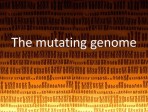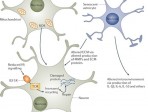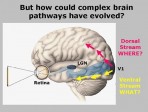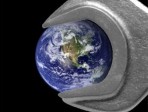 01:06:00
01:06:00
Our genomes, our history
Genetic differences between humans reflect the fundamental processes, such as mutation, recombination and natural selection, which have influenced our evolutionary history. Now that we can chart the genomes of many individuals, we are finding many su....
More details | Watch now 01:17:00
01:17:00
Mammalian biodiversity: past, present, future?
Beautiful and charismatic, mammals are biodiversity icons. But a quarter of mammalian species are now threatened with extinction, as ecosystems reel under the impact of a growing and ever more demanding human population. This lecture explores the his....
More details | Watch now 01:06:00
01:06:00
Three score years and then? The new biology of ageing
Ageing is the single greatest challenge facing our society today. Recent breakthroughs have demonstrated that it is possible to combine a long life with the absence of age-related disease. Scientists at the forefront of this research will explain the....
More details | Watch now 01:07:00
01:07:00
Genetic fingerprinting and beyond
Professor Jeffreys will describe how DNA typing can be used to solve casework and will review the latest developments, including the creation of major national DNA databases that are proving extraordinarily effective in the fight against crime.
More details | Watch now 01:00:00
01:00:00
Seeing Further – The Story of Science and the Royal Society
The Story of Science and the Royal Society - a panel discussion chaired by Melvyn Bragg. The panel is made up of Bill Bryson, Maggie Gee, Richard Holmes and Ian Stewart FRS.
More details | Watch now 01:00:00
01:00:00
The great ideas of biology
Three of the ideas of biology are the gene theory, the theory of evolution by natural selection and the proposal that the cell is the fundamental unit of all life. A fourth idea is that the organization of chemistry within the cell provides explanati....
More details | Watch now 01:00:00
01:00:00
Plastic Electronics.
Plastics have become ubiquitous structural materials due to the ease with which they can be processed at low cost into complex shapes. Imagine a world in which metals and semiconductors have similar attributes ? that is the world of Plastic Electroni....
More details | Watch now 01:00:00
01:00:00
Plasticity of the brain: the key to human development.
How do our genes program the complexity of our brains? Why is human culture so much richer than that of the Great Apes? And how has human cognitive achievement continued to accelerate, when our genetic makeup has changed very little over the past 100....
More details | Watch now 01:02:00
01:02:00
Geoengineering: a brave new world?
This is a very new and rapidly developing area of science and technology and the proposals range from placing giant mirrors in space to reflect sunlight to fertilising the oceans with nutrients in order to produce more phytoplankton to soak up atmosp....
More details | Watch now .....
.....
The eerie silence – are we alone in the universe?
Fifty years ago, a young astronomer named Frank Drake pointed a radio telescope at nearby stars in the hope of picking up a signal from an alien civilization. Thus began one of the boldest scientific projects in history: the Search for Extraterrestri....
More details | Watch now 01:02:00
01:02:00
Thinking like a vegetable: how plants decide what to do
Plants monitor a wide range of information from their surrounding environment. They combine information of multiple sorts, and respond in an appropriate way. In plants there is no brain, and the information processing is distributed across the plant ....
More details | Watch now 01:12:00
01:12:00
Brain development and brain repair.
The human brain is made up of close to a trillion nerve cells (or neurons), each of which makes connections with, on average, hundreds of other nerve cells, to form the complex neuronal circuits that control all brain activities, including perception....
More details | Watch now
